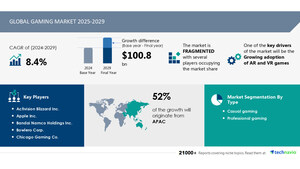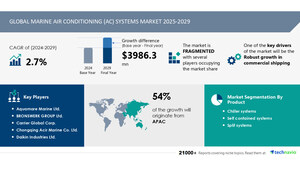NEW YORK, Sept. 9, 2024 /PRNewswire/ -- Report on how AI is redefining market landscape- The global autoinjectors market size is estimated to grow by USD 303.65 billion from 2024-2028, according to Technavio. The market is estimated to grow at a CAGR of over 36.72% during the forecast period. Increasing prevalence of allergies and need for immediate care is driving market growth, with a trend towards strategic alliances between companies. However, side-effects of autoinjectors poses a challenge. Key market players include AbbVie Inc., Amgen Inc., Bayer AG, Becton Dickinson and Co., Eli Lilly and Co., F. Hoffmann La Roche Ltd., GlaxoSmithKline Plc, Halozyme Therapeutics Inc., Johnson and Johnson Services Inc., Johnson Medtech LLC, medmix Ltd., Merck KGaA, Owen Mumford Ltd., Pfizer Inc., RAVIMED Sp. Zoo, Recipharm AB, SHL Medical AG, Teva Pharmaceutical Industries Ltd., Viatris Inc., and Ypsomed Holding AG.
AI-Powered Market Evolution Insights. Our comprehensive market report ready with the latest trends, growth opportunities, and strategic analysis- View your snapshot now
Forecast period |
2024-2028 |
Base Year |
2023 |
Historic Data |
2018 - 2022 |
Segment Covered |
Application (Anaphylaxis, Multiple sclerosis, Rheumatoid arthritis, and Diabetes), End-user (Hospitals and clinics and Self-administration), and Geography (North America, Europe, Asia, and Rest of World (ROW)) |
Region Covered |
North America, Europe, Asia, and Rest of World (ROW) |
Key companies profiled |
AbbVie Inc., Amgen Inc., Bayer AG, Becton Dickinson and Co., Eli Lilly and Co., F. Hoffmann La Roche Ltd., GlaxoSmithKline Plc, Halozyme Therapeutics Inc., Johnson and Johnson Services Inc., Johnson Medtech LLC, medmix Ltd., Merck KGaA, Owen Mumford Ltd., Pfizer Inc., RAVIMED Sp. Zoo, Recipharm AB, SHL Medical AG, Teva Pharmaceutical Industries Ltd., Viatris Inc., and Ypsomed Holding AG |
Key Market Trends Fueling Growth
Strategic alliances have been on the rise in the global autoinjectors market, with several acquisitions and partnerships aimed at business expansion through new product offerings. For instance, Novartis AG formed a commercialization and distribution agreement with Adamis Pharmaceuticals for the epinephrine autoinjector SYMJEPI in the US market. This partnership enhanced Novartis AG's commercial presence and maximized the value of SYMJEPI. In a similar vein, Halozyme Therapeutics, Inc. Acquired Antares Pharma, Inc., while Pfizer Inc. Collaborated with Antares Pharma to develop an autoinjector pen for an undisclosed Pfizer drug. Antares Pharma's QuickShot autoinjector technology and unrevealed drug are being utilized by Pfizer, with Antares providing a fully packaged product at a favorable margin. Pfizer is expected to secure US FDA approval and marketing permission for the combination product in the coming years. These development agreements between Antares Pharma and Pfizer are anticipated to expand Antares Pharma's pipeline-partnered products and increase the potential number of products utilizing Antares Pharma's QuickShot autoinjector technology platform. Overall, the increase in strategic alliances is projected to significantly contribute to the growth of the global autoinjectors market.
The Autoinjector market is experiencing significant growth due to the loss of exclusivity for biologic drugs and the increasing prevalence of chronic conditions like diabetes, rheumatoid arthritis, hormone deficiency, and anaphylaxis. Needle phobia and anaphylactic shocks have driven the demand for needle-free injectors. Epinephrine autoinjectors, such as EpiPen and autoinjector pens, remain popular for emergency conditions like anaphylaxis caused by food allergens. Medical technology advancements include audio visual cues, connectivity, and faster injection speeds. Spring-powered autoinjectors ensure safety and accuracy for various drug viscosities. Healthcare professionals and patients in home care settings benefit from these innovations. Pharmaceutical industries are investing in autoinjector devices for therapies like multiple sclerosis, asthma, hypertension, and chronic disorders. Bluetooth connectivity enables self-administering patients to monitor and manage their conditions effectively.
Insights on how AI is driving innovation, efficiency, and market growth- Request Sample!
Market Challenges
- The use of autoinjectors for administering medications brings about certain side effects that may hinder their market growth. These side effects include infections, changes in blood pressure, muscle pain, headaches, diarrhea, and allergic reactions such as dyspnea, bronchospasm, tongue edema, skin rash, and urticaria. Patients undergoing chemotherapy-induced anemia may experience additional side effects like fatigue, edema, nausea, vomiting, fever, and hypertension. In severe cases, autoinjectors for MS patients can lead to hepatic injury, including hepatic failure, and anaphylaxis. These side effects may discourage patients from using autoinjectors and encourage them to explore alternatives with fewer side effects, thereby impacting the growth of the global autoinjectors market.
- The autoinjector market faces several challenges in delivering effective and safe solutions for various therapeutic areas. These include providing audio visual cues for proper usage, ensuring reliable connectivity for dosage recording and Bluetooth functionality, maintaining fast injection speeds for emergency conditions like anaphylaxis, and addressing the needs of patients with different drug viscosities. Spring-powered autoinjectors continue to dominate, but safety and accuracy remain key concerns. Pharmaceutical industries are developing epinephrine autoinjectors for anaphylaxis, multiple sclerosis, asthma, hypertension, and other chronic disorders. Self-administering patients require easy-to-use autoinjector devices for conditions like food allergens and anaphylactic shock. Challenges include ensuring safety and accuracy for intramuscular and subcutaneous injections, addressing the needs of healthcare providers, and addressing the unique requirements of auto injector devices such as EpiPen autoinjectors, autoinjector pens, and autoinjector syringes. Innovations like safety locks, automatic drug reconstitution, and dosage recording aim to improve patient experience and outcomes.
Insights into how AI is reshaping industries and driving growth- Download a Sample Report
Segment Overview
This autoinjectors market report extensively covers market segmentation by
- Application
- 1.1 Anaphylaxis
- 1.2 Multiple sclerosis
- 1.3 Rheumatoid arthritis
- 1.4 Diabetes
- End-user
- 2.1 Hospitals and clinics
- 2.2 Self-administration
- Geography
- 3.1 North America
- 3.2 Europe
- 3.3 Asia
- 3.4 Rest of World (ROW)
1.1 Anaphylaxis- The anaphylaxis segment is the largest revenue generator in the autoinjectors market due to the rising prevalence of anaphylaxis and food allergies worldwide. For instance, approximately 8% of children in the US have food allergies, making anaphylaxis a significant concern. Epinephrine, a first-line treatment for anaphylaxis, drives the growth of the autoinjectors market. Mylan, a leading vendor, offers a generic epinephrine autoinjector, contributing to the market's expansion. Other companies are also seeking FDA approval for their epinephrine autoinjectors. Key countries in this segment include the US, Germany, the UK, and Japan. Autoinjectors for self-administration of drugs during anaphylaxis, such as Emerade by Medeca Pharma AB, are expected to fuel segment growth, as vendors provide instructional videos for proper usage.
Download complimentary Sample Report to gain insights into AI's impact on market dynamics, emerging trends, and future opportunities- including forecast (2024-2028) and historic data (2018 - 2022)
Research Analysis
Autoinjectors are medical devices designed for self-administration of medicines, particularly biologics, during emergency conditions such as anaphylactic shocks caused by food allergens or needle phobia. These devices deliver precise doses of drugs like Epinephrine or Adrenaline through a needle or needle-free system, ensuring effective therapy for patients with chronic disorders or those at risk of anaphylaxis. Healthcare professionals and pharmaceutical industries play crucial roles in the development, distribution, and education on the use of these devices. Autoinjectors come in various forms, including pens and syringes, with some featuring advanced technology like Bluetooth connectivity for tracking and monitoring. Loss of exclusivity for key brands like the EpiPen autoinjector has led to increased competition in the market, driving innovation and affordability.
Market Research Overview
Autoinjectors are medical devices used for self-administration of medications, particularly biologics, in the form of injectable drugs. With the loss of exclusivity for some key biologics, the market for autoinjectors is experiencing significant growth. These devices are essential for individuals with needle phobia or those at risk of anaphylactic shocks from food allergens or other triggers. Epinephrine autoinjectors, such as the EpiPen and autoinjector pens, are commonly used to treat anaphylaxis. Autoinjectors offer several advantages over traditional syringes, including audio visual cues, connectivity, and faster injection speeds. Spring-powered autoinjectors are popular due to their safety and accuracy, making them suitable for home care settings and self-administration by patients with chronic conditions like diabetes, rheumatoid arthritis, hormone deficiency, multiple sclerosis, asthma, hypertension, and other chronic disorders. Medical technology advances include needle-free injectors and Bluetooth connectivity for dosage recording and safety locks. Autoinjectors are also used in emergency conditions, such as anaphylactic shock, and come in various forms, including autoinjector pens, syringes, and devices for automatic drug reconstitution. Pharmaceutical industries are investing heavily in the development of new autoinjector technologies to improve patient care and outcomes.
Table of Contents:
1 Executive Summary
2 Market Landscape
3 Market Sizing
4 Historic Market Size
5 Five Forces Analysis
6 Market Segmentation
- Application
- Anaphylaxis
- Multiple Sclerosis
- Rheumatoid Arthritis
- Diabetes
- End-user
- Hospitals And Clinics
- Self-administration
- Geography
- North America
- Europe
- Asia
- Rest Of World (ROW)
7 Customer Landscape
8 Geographic Landscape
9 Drivers, Challenges, and Trends
10 Company Landscape
11 Company Analysis
12 Appendix
About Technavio
Technavio is a leading global technology research and advisory company. Their research and analysis focuses on emerging market trends and provides actionable insights to help businesses identify market opportunities and develop effective strategies to optimize their market positions.
With over 500 specialized analysts, Technavio's report library consists of more than 17,000 reports and counting, covering 800 technologies, spanning across 50 countries. Their client base consists of enterprises of all sizes, including more than 100 Fortune 500 companies. This growing client base relies on Technavio's comprehensive coverage, extensive research, and actionable market insights to identify opportunities in existing and potential markets and assess their competitive positions within changing market scenarios.
Contacts
Technavio Research
Jesse Maida
Media & Marketing Executive
US: +1 844 364 1100
UK: +44 203 893 3200
Email: [email protected]
Website: www.technavio.com/
SOURCE Technavio

WANT YOUR COMPANY'S NEWS FEATURED ON PRNEWSWIRE.COM?
Newsrooms &
Influencers
Digital Media
Outlets
Journalists
Opted In






Share this article